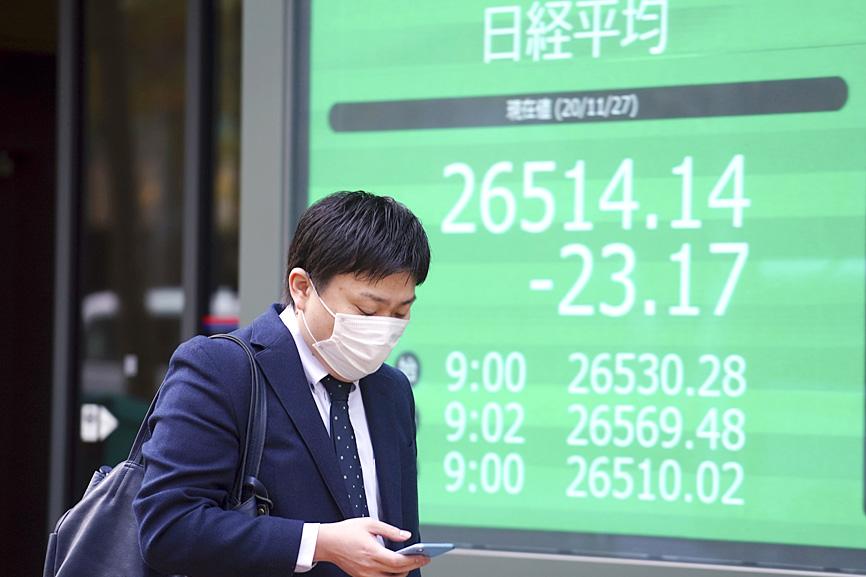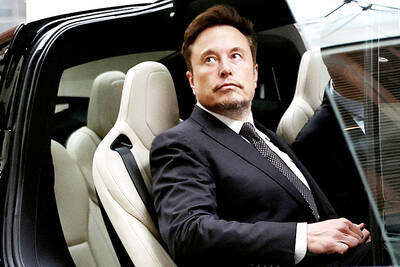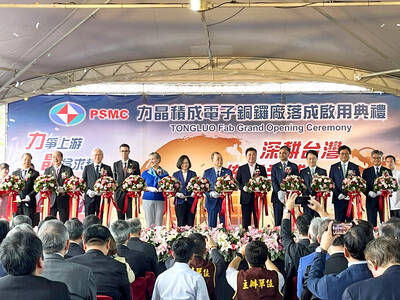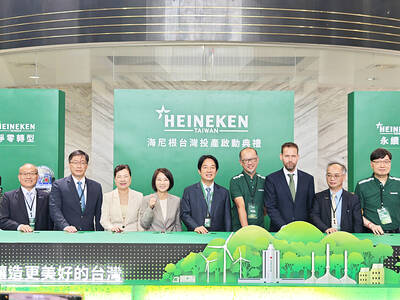Asian stock markets were mixed on Friday as questions about the effectiveness of one COVID-19 vaccine candidate weighed on investor optimism.
Benchmarks in Mumbai and Sydney retreated, while Hong Kong, Tokyo and Seoul gained.
Investors have been encouraged by reports of progress toward a possible vaccine.

Photo: AP
However, they were uneasy after researchers questioned data that showed a candidate from the University of Oxford and AstraZeneca was 70 percent effective.
“Market participants showed increasing signs of nervousness as data errors were revealed,” Mizuho Bank Ltd said in a report.
The MSCI Asia-Pacific ex-Japan index rose 0.15 percent to 635.20, up 1.6 percent for the week.
In Taipei, the TAIEX rose 0.2 percent to 13,867.09, adding 1.1 percent for the week.
Hong Kong stocks ended at a nine-month high on Friday, gaining for the fourth week in a row, tracking mainland strength as upbeat profits from industrial firms pointed to a continued recovery in China’s economy.
The Hang Seng Index (HSI) rose 0.3 percent to 26,894.68, its highest closing level since Feb. 21, while the China Enterprises Index (HSCE) gained 0.8 percent to 10,790.30 points.
For the week, the HSI rose 1.7 percent, while the HSCE climbed 2.2 percent, both posting their fourth week of gains in a row.
Profits at Chinese industrial firms last month rose 28.2 percent annually, official data showed, pointing to a steady recovery in the manufacturing sector after it was hit by the pandemic.
China’s factory activity likely expanded at a slightly faster pace this month, a Reuters poll showed on Friday, as the world’s second-largest economy steadily recovers from the coronavirus crisis.
“Overall, we believe China’s economic recovery remains largely on track and maintain our real GDP growth forecast of 5.7% y-o-y for Q4, up from 4.9% in Q3. We firmly believe Beijing will maintain its policy stance,” Nomura Holdings Inc analysts wrote in a note on Friday.
The benchmark Hang Seng Index would face resistance at about the 27,000-point level, the brokerage added.
The Hang Seng financials index gained 3.7 percent for the week, its fourth straight weekly gain.
In Japan, the Nikkei 225 on Friday rose 0.4 percent to 26,644.71, up 4.4 percent weekly, while the TOPIX rose 0.5 percent, bringing its weekly gain to 3.4 percent.
The KOSPI in Seoul added 0.3 percent to 2,633.45 points, rising 3.1 percent for the week.
Sydney’s S&P-ASX 200 on Friday fell 0.5 percent to 6,601.10 points, paring its weekly gain to 0.9 percent.
India’s SENSEX fell 0.3 percent, but was up 0.6 percent for the week. New Zealand, Bangkok and Jakarta gained, while Singapore retreated.
Additional reporting by staff writer

purpose: Tesla’s CEO sought to meet senior Chinese officials to discuss the rollout of its ‘full self-driving’ software in China and approval to transfer data they had collected Tesla Inc CEO Elon Musk arrived in Beijing yesterday on an unannounced visit, where he is expected to meet senior officials to discuss the rollout of "full self-driving" (FSD) software and permission to transfer data overseas, according to a person with knowledge of the matter. Chinese state media reported that he met Premier Li Qiang (李強) in Beijing, during which Li told Musk that Tesla's development in China could be regarded as a successful example of US-China economic and trade cooperation. Musk confirmed his meeting with the premier yesterday with a post on social media platform X. "Honored to meet with Premier Li

ARTIFICIAL INTELLIGENCE: The chipmaker last month raised its capital spending by 28 percent for this year to NT$32 billion from a previous estimate of NT$25 billion Contract chipmaker Powerchip Semiconductor Manufacturing Corp (力積電子) yesterday launched a new 12-inch fab, tapping into advanced chip-on-wafer-on-substrate (CoWoS) packaging technology to support rising demand for artificial intelligence (AI) devices. Powerchip is to offer interposers, one of three parts in CoWoS packaging technology, with shipments scheduled for the second half of this year, Powerchip chairman Frank Huang (黃崇仁) told reporters on the sidelines of a fab inauguration ceremony in the Tongluo Science Park (銅鑼科學園區) in Miaoli County yesterday. “We are working with customers to supply CoWoS-related business, utilizing part of this new fab’s capacity,” Huang said, adding that Powerchip intended to bridge

Dutch brewing company Heineken NV on Friday announced an investment of NT$13.5 billion (US$414.62 million) over the next five years in Taiwan. The first multinational brewing company to operate in Taiwan, Heineken made the statement at a ceremony held at its brewery in Pingtung County. It also outlined its efforts to make the brewery “net zero” by 2030. Heineken has been in the Taiwanese market for 20 years, Heineken Taiwan managing director Jeff Wu (吳建甫) said. With strong support from local consumers, the Dutch brewery decided to transition from sales to manufacturing in the country, Wu said. Heineken assumed majority ownership and management rights

Microsoft Corp yesterday said that it would create Thailand’s first data center region to boost cloud and artificial intelligence (AI) infrastructure, promising AI training to more than 100,000 people to develop tech. Bangkok is a key economic player in Southeast Asia, but it has lagged behind Indonesia and Singapore when it comes to the tech industry. Thailand has an “incredible opportunity to build a digital-first, AI-powered future,” Microsoft chairman and chief executive officer Satya Nadella said at an event in Bangkok. Data center regions are physical locations that store computing infrastructure, allowing secure and reliable access to cloud platforms. The global embrace of AI